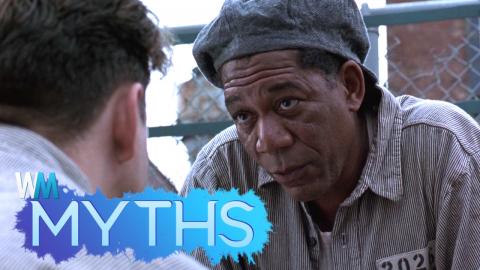Top 5 Myths about Prison

On the inside, you'll have a lot more to worry about than dropping the soap! Join http://www.WatchMojo.com for Top 5 Myths, the series that finds the biggest myths people actually believe, and dispels them one by one. In today's installment, we'll be looking at the top 5 myths about prison.
Many of these misconceptions come from movies, and while they often present a fairly accurate depiction of a prison life, creative liberties are of course taken in the entertainment industry. We've also kept the focus here on prisons in the Western world. With that out of the way, let's open up visitor hours as we count down the five most often-believed myths about prison.
What did you think of this list? Submit your ideas four our next video at http://www.WatchMojo.comsuggest
#5 - Guards have all the power
Whether it’s the Shawshank Redemption or Sleepers, one myth that Hollywood loves to perpetuate is that guards have all the power - and they’re drunk on it. In reality, prison guards work long hours, typically 12 hour shifts, don’t get paid very much and face constant berating from inmates. An abusive or sadistic guard in a prison is really just setting himself up for a nasty pummeling. Sure, inmates who rebel and attack their guards can be dealt extra years on their sentence as punishment, but if you’re already serving a life sentence, there’s not much incentive to settle your differences with words as opposed to punches, kicks and prison shanks.
#4 – Jail and Prison are the Same Thing
When someone says they got “locked up” or put in “the clink”, the meaning is pretty clear. They aren’t going anywhere, anytime soon. But the terms “jail” and “prison” are not as clear-cut. While often used interchangeably in conversation, the two have vastly different meanings. Jails are typically run by local law enforcement and are designed to hold inmates awaiting trial, or those serving short sentences for misdemeanour crimes like petty theft or public intoxication. Prisons on the other hand, are usually state-run facilities that are more equipped to handle serious offenders serving long sentences. In general, prisons are considered more favourable for the inmate, as they have more developed programs and facilities, and the permanent nature of the inmate’s stay allows for a more routine eating, sleeping and exercise schedule.
#3 - Minimum security prison is for minor offenses
We all know minimum security prisons are for tax evaders and jaywalkers right? Not true. Minimum-security prisons are comprised mostly of criminals who have graduated from medium and maximum-security facilities and are close to being reintegrated into society. They are designed to house low-risk offenders and generally don’t have fences, walls or any kind of perimeter structures. Some facilities even offer day parole, allowing inmates to participate in community-based activities outside of prison during the day, returning to confinement by night. What’s more, it’s unusual that an inmate spends their whole sentence at the same security level. Instead, inmates are moved based on their conduct and usually end up at the minimum level nearing the end of their sentence.
#2 - Sexual assault is a part of prison life
“Don’t drop the soap!” is that classic line you say to anyone sent to the slammer, but should that really be their main concern? Contrary to what you might think after watching an episode of Oz, the prevalence of sexual assault and rape in prison is actually rather low. In the US for example, between 0.7 and 6.3 percent of inmates reported being sexually victimized. And although even one sexual assault is too many, the numbers do not reflect the "rape frenzy" envisioned by pop culture. By some accounts, much of the sexual activity in prisons is consensual, with the more “desirable” inmates gradually embracing their good looks and using them to their advantage. I mean, everyone's gotta get some, especially since only four states in the US allow conjugal visits.
#1 - Your life stops once you are sent to prison
Although it's never a good thing to be sent to prison, inmates are provided with plenty of opportunities for personal growth through educational programs, vocational training and correspondence programs. Statistically, inmates who receive these kinds of training are far less likely to return to prison and are far more likely to find employment once being released. On the flipside, however, just as your life keeps going in prison, so too do your debts and responsibilities on the outside. If you have income or investments coming in during your sentence, you still have to file a federal tax return. If you have personal debts on the outside, it’s likely they will get worse, as prison wages for unskilled institutional positions such as food service, grounds keeping or warehouse work are very low – between 12 and 40 cents US per hour- not nearly enough to cover credit card or student loan payments. So if you’re the sole breadwinner in your family, think wisely before committing a crime. It can lead to a long and arduous cycle of debt.
So, how many of these myths did you believe? Here’s what Google searchers think about Prison. Is Jail REALLY that bad? What kind of jail for DUI? Does jail make you gay? For more soapy top 10s and Super Max Top 5s, be sure to subscribe to WatchMojo.com.


 0
0
 1
1
 report
report